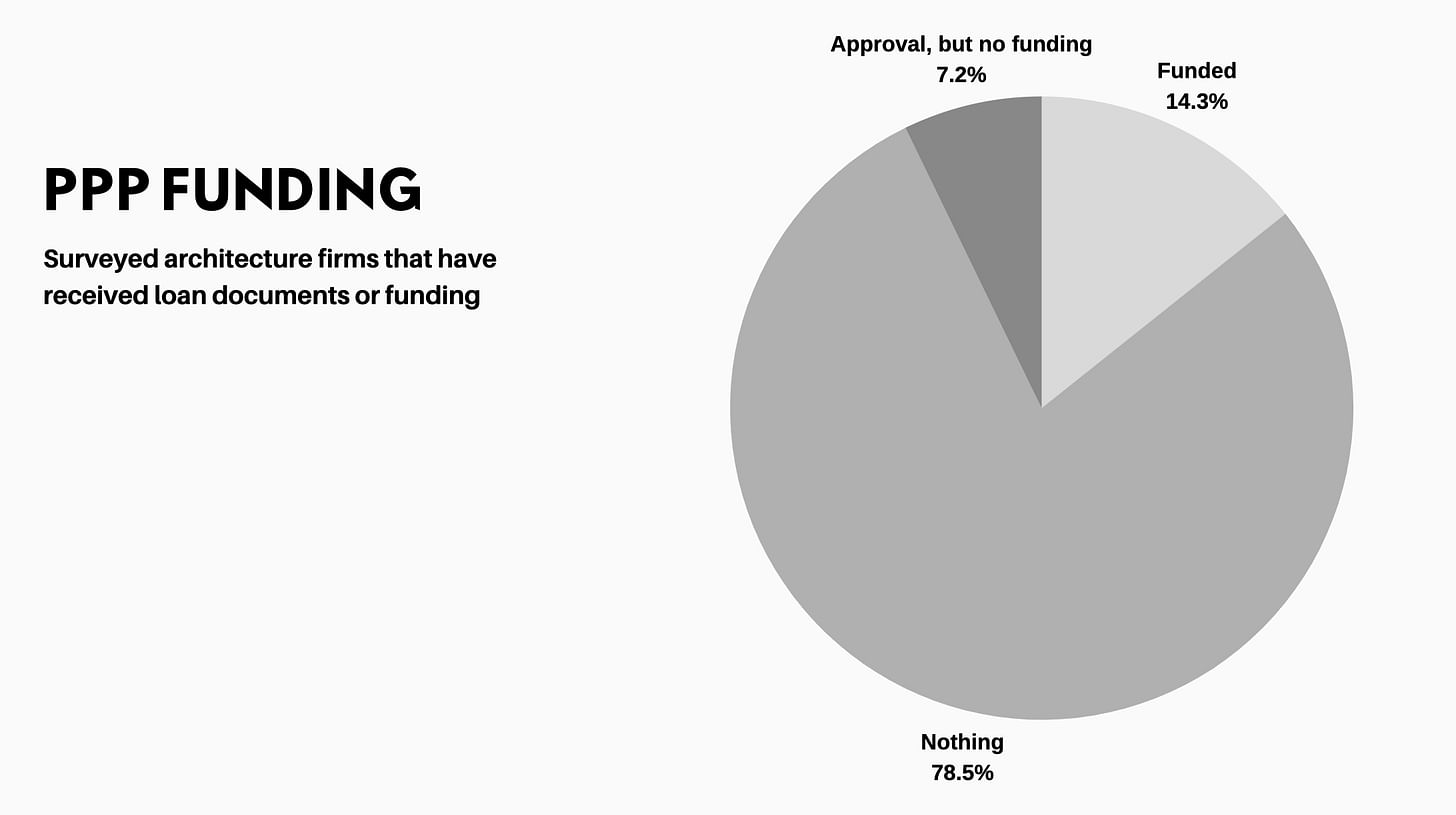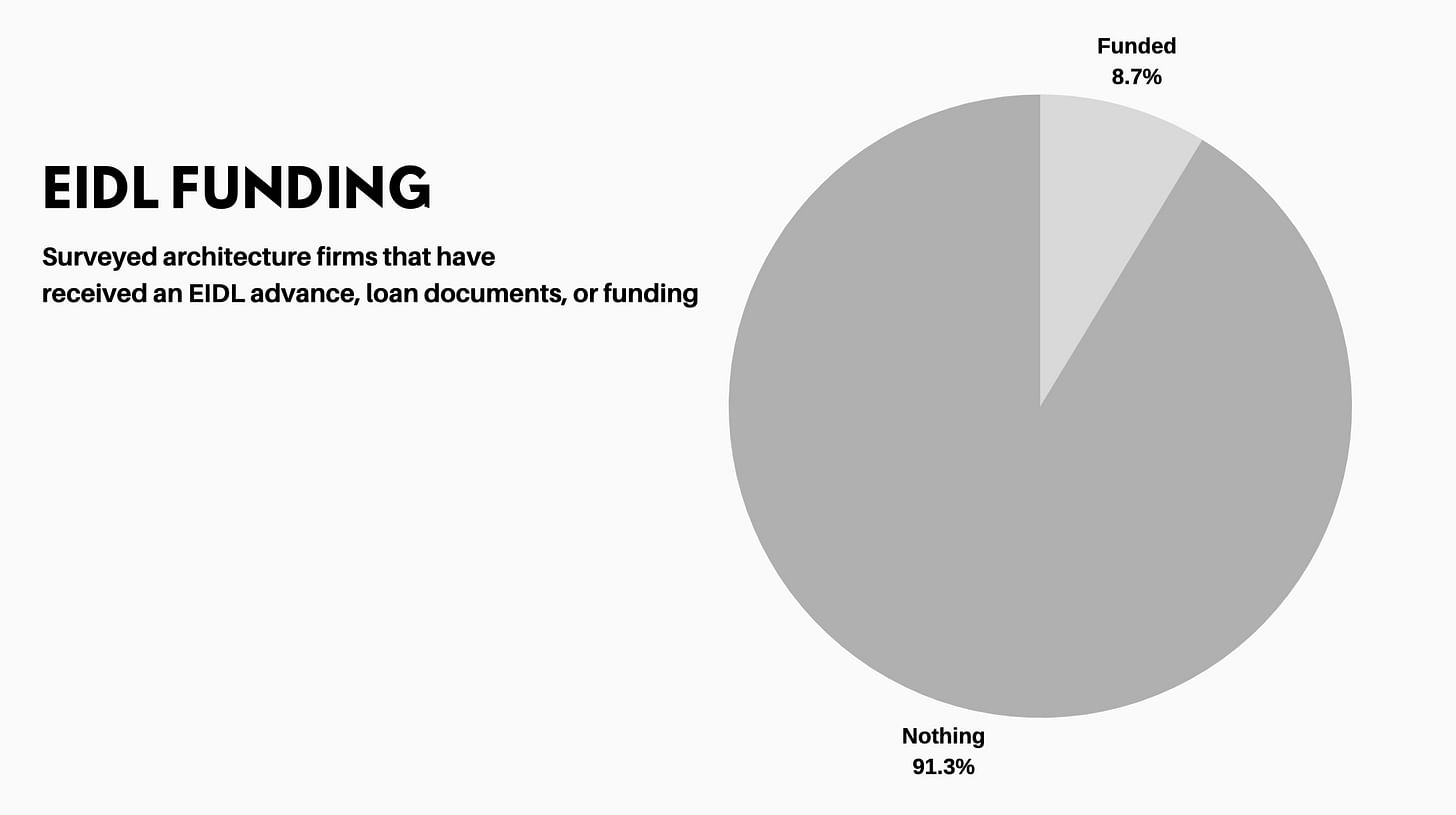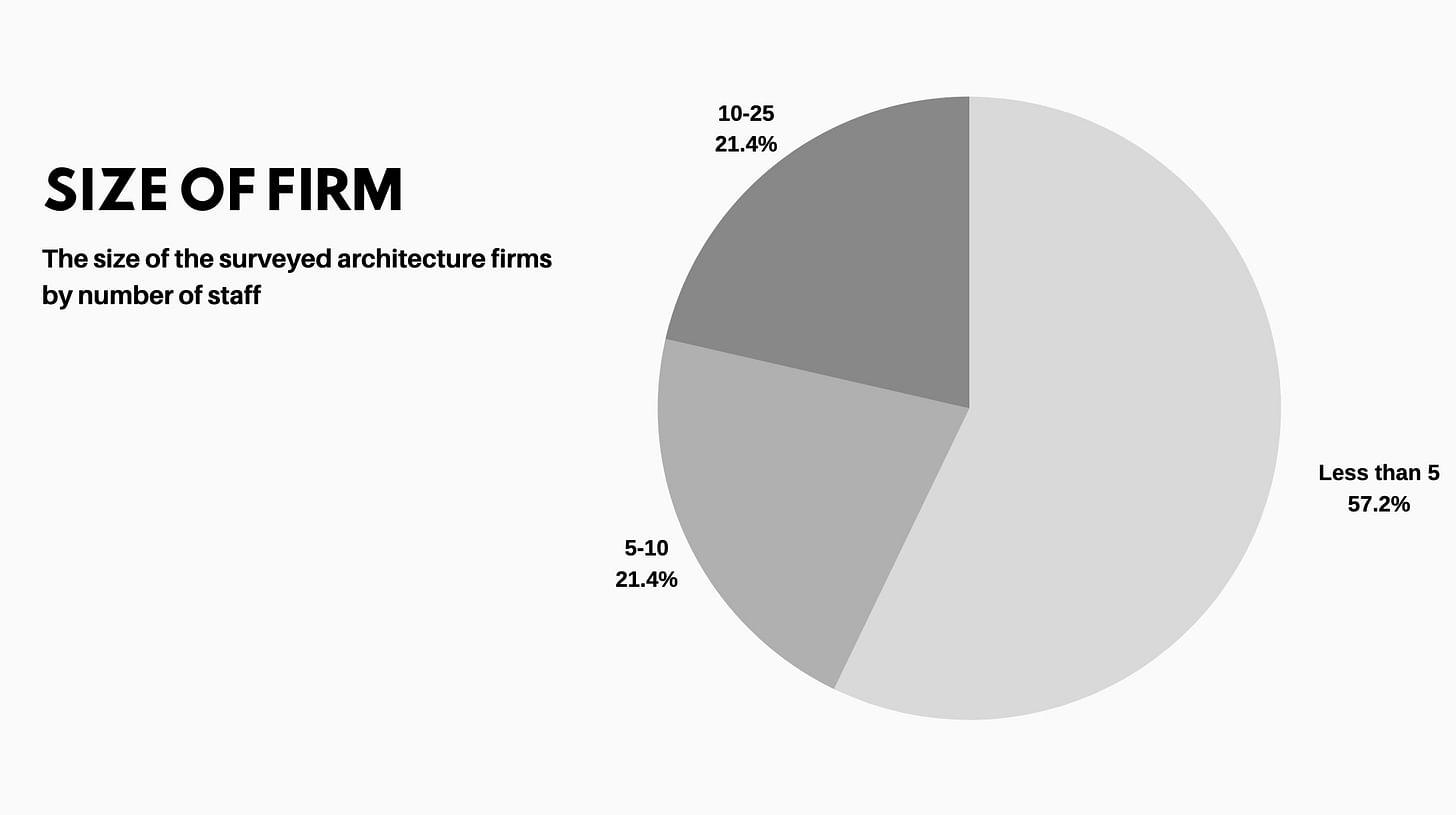

“Tiring,” “Mismanaged and not communicative,” “Disappointing, but not surprising,” “Time consuming, anxiety riddled, frustrating,” “Horrendous.”
These are some of the words that architecture firm leaders have used to describe their experiences, via Archinect’s COVID-19 Economic Relief Survey, while attempting to access the small business relief programs crafted by the federal government in response to the COVID-19 crisis. The botched roll-out of the emergency economic aid package and its attendant Payment Protection Program and Small Business Administration-backed loan initiatives has accelerated an already fast-burning financial crisis among small businesses across the country, including within the architecture community, where many firms operate on thin margins even in good economic times.
As stay-at-home orders have spread across the country to limit the spread of the virus, firms have seen work on construction projects stop or slow down significantly. In addition, many offices, as recent national surveys have shown, have seen work on the design phases of current projects slow down or stop entirely. Significant numbers of practices have encountered personnel issues as the overall transition to work-from-home arrangements has created new fundamental problems with regards to childcare and other forms of caregiving, technology problems, and issues with communication and productivity amid a global health and economic crisis that only grows worse by the day.

Adding to these challenges has been the sense of apparently false hope created by the government’s aid programs, which include $350 billion in forgivable loans extended to cover payroll and overhead, certain tax rebates for keeping current employees on salary, and other emergency loan initiatives targeted toward small- to medium-sized businesses. As Archinect reported last week, the $350 billion in funding available for the PPP was quickly used up as the program went live, even before a significant number of businesses around the country were unable to even apply. Recent news reports have indicated that the under-funded program ran dry, in part, due to large business, including fast food franchises and other significant corporations, gobbling up the paltry relief funds earmarked for American small businesses.
Respondents to Archinect’s COVID-19 Economic Relief Survey echoed these anecdotal accounts.
I think many small firms will not survive this. It has really brought home how close to the bone many firms run and how little cash reserves we typically have.

For example, while over 90% of respondents indicated that they had applied for PPP funding, over 40% have yet to even receive a response. Of those who did hear back, only 14% have had their loans funded. 78% have not had funds disbursed to them, a troubling statistic given that 100% of the firms that responded to the survey are made up of less than 25 employees, with the majority, 57%, operating with five or fewer workers. At these staffing levels, the difference between

Of those that applied for an Economic Injury Disaster Loan (EIDL), only 39% have received a response from the SBA regarding their loan application. Of those that have heard back a paltry 8% have received loan documentation or funding.
With companies burning through cash reserves or initiating employee layoffs as the crisis drags on, the implications of slow and inadequate funding are dire. One respondent tells us, “If we can't get into the 2nd phase of this, we will have to cut 75% of the staff (most of our projects have stopped) and finish the existing projects. Unless there is a turn around in a month and the economy starts up, we will probably cease operations at the end of 2020. Our firm is 39 years old.”
Maintain an active relationship with the people at your bank!” one architect writes, “Good times and bad, having that relationship is on the top 5 list of every 'starting your own business' list for a reason.

Another writes, “I think many small firms will not survive this. It has really brought home how close to the bone many firms run and how little cash reserves we typically have.”
One respondent explains that the experience has tarnished their expectations of how effective any response to the crisis might be: “That the relief funds aren’t available has damaged my optimism and belief that the government has any organized plan to help small business owners. Where did the funds go? I suspect large corporations with over 100 employees. I am focusing on marketing.”
That the relief funds aren’t available has damaged my optimism and belief that the government has any organized plan to help small business owners.
For others, the lagging federal response has been made worse through the program’s reliance on private banking institutions for the handling and dispersing of the loans. One architect explains: “Our bank unnecessarily held up the application process while they crafted a ridiculously complicated process that extended the runway so far that the funding has now run out. An incredibly difficult, frustrating and ultimately fruitless exercise. All the more painful as many other businesses around us with smaller banks have had their PPP applications approved.”
This comment echoes other advice offered by successful applications. “Maintain an active relationship with the people at your bank!” one architect writes, “Good times and bad, having that relationship is on the top 5 list of every 'starting your own business' list for a reason.”
Another issued a similar comment, writing, “Will probably switch to a smaller local bank in the future after this crisis is over. Most peers who bank with smaller institutions have received approval and funding.”
The possibility for response bias is of course present in our survey, but even so, of the 28 people who filled out the survey, only one firm left an overly positive comment regarding the economic aid situation: “Overall pretty happy with fed government management of these programs,” this architect writes, “Details were slow to come out but movement and dispersal of funds has been quick.”
The rest? “Underwhelmed,” at best.
Editor’s Note: We’re going to keep this survey up until the end of the week for additional responses and will provide further editorial updates if there is enough additional feedback to report on updated findings.
We will also release follow-up surveys if the government funds another round of loans or if new support programs are introduced.
Antonio is a Los Angeles-based writer, designer, and preservationist. He completed the M.Arch I and Master of Preservation Studies programs at Tulane University in 2014, and earned a Bachelor of Arts in Architecture from Washington University in St. Louis in 2010. Antonio has written extensively ...
4 Comments
Great article! Thanks!
Having a long relationship with a bank is great if you are an old firm. However, if you started in 2019 or later, this one-size-fits all doesn't work. As we are seeing, the State is collapsing into a socialist style system where you have to know somebody who knows somebody to get a good position in the bread line.
ahh yes, old school socialism and if you get out of line they take you out back, shoot you in the head and pretend like nothing happened (client tell me story, zis iz how zay do in old country - socialism)
Cronyism? Under this administration? I'm gonna need to see some backup on that one, sir or madam.
Block this user
Are you sure you want to block this user and hide all related comments throughout the site?
Archinect
This is your first comment on Archinect. Your comment will be visible once approved.